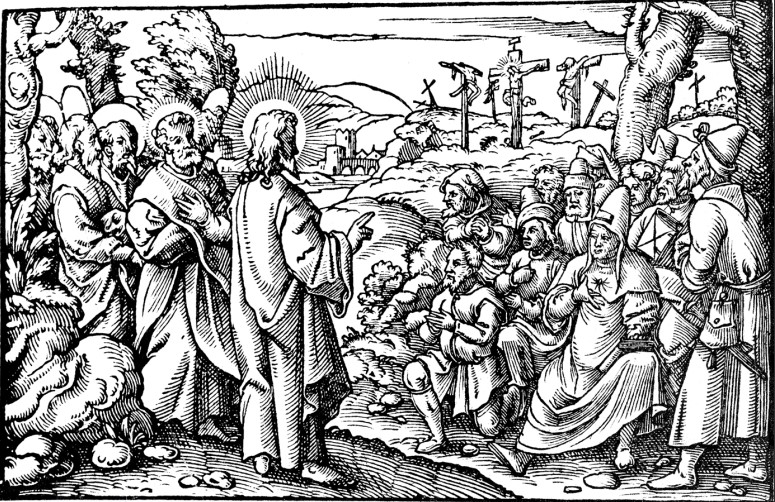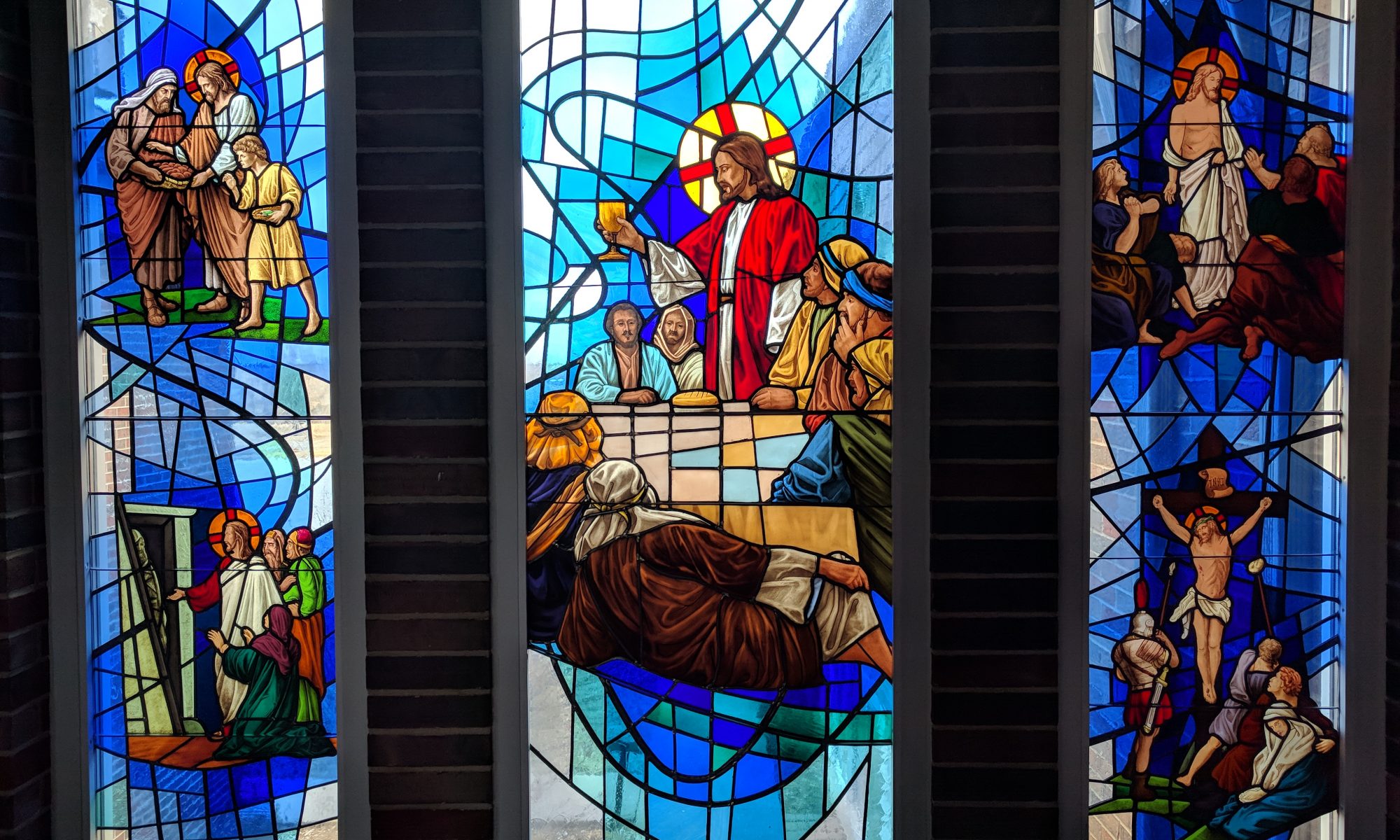
Lessons: Ezekiel 36:22-28, 1 Peter 4:7-14, John 15:26-16:4
Hymns: LSB 465, 553, 633, 768
Grace, mercy, and peace to you from God our Father and our Lord and Savior, Jesus Christ. Amen.
Today is often known as waiting Sunday because it is the only Sunday between the Ascension of Jesus and the coming of the Holy Spirit. Forty days after Easter, Jesus ascended into Heaven. We had an ascension service this past Thursday, on that fortieth day. Ascension is supposed to be one of the greater feasts in the Church year but sadly too many people pay no attention to it. The psalm for Ascension sets the tone: “God has gone up with a shout, the Lord with the sound of a trumpet. Sing praises to God… For God is the King of all the earth” (Psalm 47).
Once Jesus ascended into Heaven, the disciples were instructed to wait in Jerusalem for the coming of the Holy Spirit. Jesus did not tell them how many days they needed to wait. He didn’t say precisely how the Holy Spirit would come upon them. The Spirit came ten days after our Lord’s ascension. We are in day three. There’s one more week to go until Pentecost. Ten days of waiting in all.
The theme of waiting fits well with today’s Epistle. Peter says, “The end of all things is at hand” (1 Pet. 4:7). He doesn’t say the end is here. Instead, he says it is coming. Just as the disciples did not know when the Spirit would arrive, so also, we do not know when the end will arrive. And so we wait. We wait because the end is at hand.
Peter suggests that the End is an urgent matter that requires our attention. To think Peter wrote these words about 1961 years ago! And Jesus still has not returned! Because of the urgency in which Peter writes, this means we must be always ready for the return of Christ, and we ought to give careful attention to our conduct all the time.
So, what do we do during this time of waiting? How do we live our lives? Peter spends much of his epistle teaching us, so I commend the book of 1 Peter to your reading on your own. It’s only 5 chapters.
Essentially Peter teaches a life of holiness. He warns against lewdness, lusts, drunkenness, revelries, drinking parties, abominable idolatries, murder, theft, evildoing, and being busybodies. He teaches that there will be much suffering among Christians because many in this world will not like the Christian’s way of life or beliefs.
But holiness is not something we have only when we avoid sin. Instead, holiness is given to us. Peter shows we are holy through Baptism. We can only have good conscience because of what Christ offers and gives in Baptism. 1 Peter 3:21 teaches that Baptism saves us—Baptism takes our sins away. With our sins removed and guilt canceled out, we can have a good conscience before God.
You see, the Church is centered around Christ and the forgiveness of sins. Without Christ, we cannot have the forgiveness of sins. Without the forgiveness of sins, we cannot have a good conscience.
What does your conscience tell you? It ought to tell you that you are doing something wrong when you are doing it. If this is the case, listen to your conscience. Don’t dull it by ignoring it or pretending that your conscience has nothing to say.
But what about when you’ve committed sin? If you listen to the Bible about your sin, you will know that you are guilty. You will probably even feel guilty for what you have done.
But also listen to the Bible which says that Jesus is the Lamb of God who takes away the sin of the world. Jesus declared, “It is finished!” on the cross. He answered for all your sins through the shedding of His Blood. He paid for them all through His sufferings and death on the cross.
And Jesus sent His Spirit as He has promised. The Spirit has guided us in the way of the truth. Through the Word and Sacraments, the Spirit works faith in our lives. Through this faith, the Spirit delivers to us the very forgiveness Jesus earned for us on the cross.
With this forgiveness we now have a good conscience. We are declared saints. We are pure and holy in the eyes of God.
And our believing neighbors ought to have the same appearance to us as well.
Yes, you are pure and holy in the eyes of God.
Now look around you. Who do you see? You see a church. You see Christians.
What do you think when you see them? Do you just remember what they said and did that hurt you years ago? Do you think about the time they made the newspaper for their crimes? Do you think about how they should have been caught and made the newspaper?
What do you see in your Christian neighbors? How do you treat them?
Well, Peter teaches us. First, Peter says, be serious and watchful in your prayers. When we pray, we do not just pray for our physical needs, but we also pray for spiritual needs. And Peter isn’t teaching you to pray about your own self all the time. Instead, Peter is teaching you to pray for yourselves and for your neighbors. The end is coming. We don’t know when Jesus will return. We don’t know when we or our neighbors will die. So, we pray for ourselves, and we pray for our neighbors. We pray that they will receive the implanted Word with meekness because that Word saves their souls (James 1:20).
So let’s use our church directories to pray for all those in our congregation. We especially pray for those who are struggling spiritually or if they have become delinquent in their church attendance and use of the means of grace.
We may also think about those living near us who are not members. If they have no church home—or if they are inactive in their own church—or if they attend a church that teaches false doctrine, we pray for them that they may see the light of the Gospel, take comfort in it, and make use of it.
We also pray for ourselves. We pray that we always remain on guard, that we do not allow the pleasures and the cares of the world to get in the way, that we do not fall away from the faith through indifference and neglect.
After all, the end of all things is at hand. Jesus will return—He will return as a thief in the night. That is, He will return at a time that is least expected. We do not want to be caught unawares, nor do we want to see our neighbor caught unawares.
In the next verse Peter declares, “Keep loving one another earnestly, since love covers a multitude of sins” (1 Pet. 4:8). We need to ask the Lutheran question, “What does this mean?” This verse is often misunderstood. Many think the phrase, “Love covers a multitude of sins” means we need to ignore the sins of our neighbor and just assume they will be saved even if they persist in their sin.
But would Peter really mean to imply that people are allowed to persist in their sin, and we should ignore sin when the end is at hand?
No, he doesn’t imply this at all. Remember, throughout his epistle, Peter warns against all kinds of sins.
So what, then, is Peter really trying to say when he writes, “Love covers a multitude of sins?” To get the answers, let’s see what passage Peter is quoting and let’s look at another parallel verse to this one. Peter is quoting Proverbs 10:12, where it is written, “Hatred stirs up strife, but love covers all sins.” Much of Proverbs 10 deals with how we use our mouths. We do not use our mouths to lie or speak evil. Instead, we use our mouths to speak the truth and to speak wisely. Also, we hear in James 5:19-20 these words, “My brothers, if anyone among you wanders from the truth and someone brings him back, let him know that whoever brings back a sinner from his wandering will save his soul from death and will cover a multitude of sins.”
As James teaches, covering a multitude of sins does not mean we should ignore sin as if it does not matter. Instead, James writes that we should turn sinners away from their sin. Sinners need to be turned away from their sin so that their souls will be saved. If we tell people that it is ok to persist in a sin, we are telling them that we do not want to save their souls. That’s not love, but ignorance at best and hatred at worst!
Indeed, the loving thing is to convince, rebuke, exhort with all longsuffering and teaching (2 Tim 4:2). Or as it is written in Galatians 6:1, “Brothers, if anyone is caught in any transgression, you who are spiritual should restore him in a spirit of gentleness.”
To love a person does not mean to condone or permit sin. To love a person means to call to repentance and to forgive.
For the end of all things is at hand. When you live lives of continual repentance seeking to amend our conduct for the better, receiving forgiveness, and being in the Word, you are ready for the day of reckoning. You are ready for the return of Jesus.
His declaration on the Last Day will not be the one you deserve. You deserve to hear the words, “Guilty! Depart from me you who practice lawlessness!” But since Christ has clothed you with His righteousness in Baptism, since you have been washed with the Blood of the Lamb, since you have been fed the words of eternal life, Christ our Lord will declare to you, “Not Guilty!” He will line you up on his right side. He will separate you from the unbelievers. And He will grant you eternal salvation.
So, while we wait for the Last Day, we repent, we receive Christ’s gifts, and we rejoice in the innumerable blessings of our Lord! Amen.
The peace of God which passes all understanding keep your hearts and minds in Christ Jesus to life everlasting. Amen

